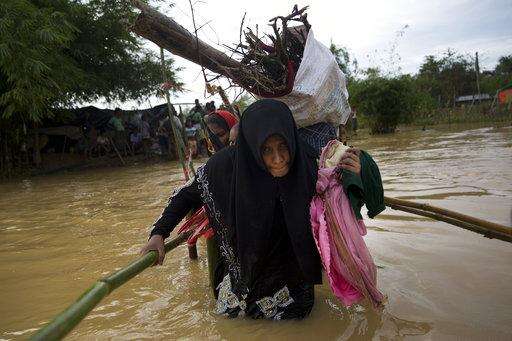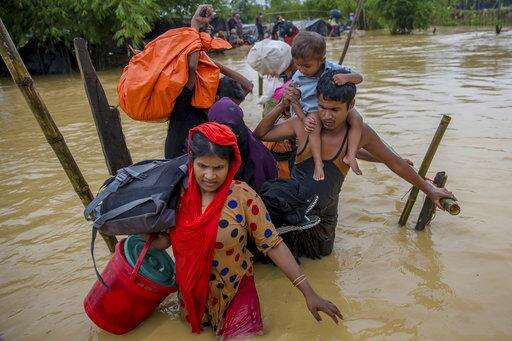Rohingya Muslims, who crossed over recently from Myanmar into Bangladesh, cross a flooded area to find alternate shelter after their camp was inundated with rainwater near Balukhali refugee camp, Bangladesh, Tuesday, Sept. 19, 2017. With a mass exodus of Rohingya Muslims sparking accusations of ethnic cleansing from the United Nations and others, Myanmar leader Aung San Suu Kyi on Tuesday said her country does not fear international scrutiny and invited diplomats to see some areas for themselves. (AP Photo/Bernat Armangue)
The Associated Press
COX'S BAZAR, Bangladesh (AP) - Weary and uncertain, they carried whatever they could on their backs, trudging through monsoon rains and enduring relocations and extortion attempts as they struggle to find small patches of land that can be their own, at least for a moment.
Groups of Rohingya Muslims who fled Myanmar were on the move again Tuesday and Wednesday, forced by the rains to salvage what was left of their shanties and move toward drier ground in hopes of some relief - if the mudslides don't come next.
Several Rohingya camps in this Bangladesh coastal city are flooded from three days of unrelenting downpours. People in the camps were pelted with heavy rain while desperately packing their meager belongings into plastic sacks and trying to find fresh shelter.
The initial arrivals in the most recent exodus from violence in Myanmar simply settled on whatever patch of land they could find, building shelters of bamboo sticks and plastic sheets.
But as their numbers soared to more than 420,000 in a matter of weeks, the local government has started moving them to newly allocated refugee camp areas. Many refused to move, terrified of being without shelter at all. But the rains washed away many shanties or made them uninhabitable.
So they're moving again. Most of them are being sent to the new settlement of Balukhali in Cox's Bazar.
If the rain doesn't ease soon, the flimsy homes may become useless at best and dangerous at worst. The area is prone to mudslides during the seasonal monsoon that have already proven deadly this year.
For Abul Bashar, that concern will come later, if at all. For now, he needs to shelter his family of 12 from the rain.
They were made to pull up the shelters they had first built on an open field. Now they've moved to Balukhali.
But like all crises, the Rohingya exodus is an opportunity for exploitation and a camp mafia is taking advantage.
Bashar doesn't have the 2,000 taka ($24) to pay them to set up a shelter in this camp.
The family slept in the tent of an acquaintance, but things are tight for everyone, and Bashar says he must find a shelter of his own soon.
He has plastic sheets and bamboo sticks. Just no money to buy a spot.
In the vast open ground where the new refugees had built their first shelters now lie piles of things they simply stuff into bags and carry to their new homes.
Not too far away, in the area where all the shelters were almost submerged, some refugees stood near bundles of their belongings unsure of what to do next.
"We made a shelter here and now it's washed away and I don't know what to do now," said Mohammad Isaq, 50.
"I haven't eaten properly in three days. I'm too weak to take all our belongings to another place."
Rohingya Muslims, who crossed over recently from Myanmar into Bangladesh, stand in a queue to receive food being distributed near Balukhali refugee camp in Cox's Bazar, Bangladesh, Tuesday, Sept. 19, 2017. More than 500,000 Rohingya Muslims have fled to neighboring Bangladesh in the past year, most of them in the last three weeks, after security forces and allied mobs retaliated to a series of attacks by Muslim militants last month by burning down thousands of Rohingya homes in the predominantly Buddhist nation. (AP Photo/Bernat Armangue)
The Associated Press

Rohingya Muslims, who crossed over recently from Myanmar into Bangladesh, carry their belongings and leave their flooded camp for alternate shelter near Balukhali refugee camp in Cox's Bazar, Bangladesh, Tuesday, Sept. 19, 2017. More than 500,000 Rohingya Muslims have fled to neighboring Bangladesh in the past year, most of them in the last three weeks, after security forces and allied mobs retaliated to a series of attacks by Muslim militants last month by burning down thousands of Rohingya homes in the predominantly Buddhist nation. (AP Photo/Bernat Armangue)
The Associated Press

Rohingya Muslims, who crossed over recently from Myanmar into Bangladesh, carry their belongings and move to find alternate shelter after rainwater inundated their camp near Balukhali refugee camp in Cox's Bazar, Bangladesh, Tuesday, Sept. 19, 2017. More than 500,000 Rohingya Muslims have fled to neighboring Bangladesh in the past year, most of them in the last three weeks, after security forces and allied mobs retaliated to a series of attacks by Muslim militants last month by burning down thousands of Rohingya homes in the predominantly Buddhist nation. (AP Photo/Bernat Armangue)
The Associated Press

Rohingya Muslims, who crossed over from Myanmar into Bangladesh, use a makeshift footbridge as they move with their belongings after their camp was inundated with rainwater near Balukhali refugee camp, Bangladesh, Tuesday, Sept. 19, 2017. With a mass exodus of Rohingya Muslims sparking accusations of ethnic cleansing from the United Nations and others, Myanmar leader Aung San Suu Kyi on Tuesday said her country does not fear international scrutiny and invited diplomats to see some areas for themselves. (AP Photo/Dar Yasin)
The Associated Press